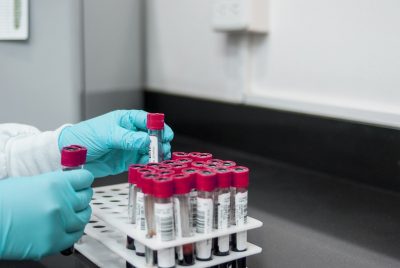One out of every 75 individuals with ovaries will receive an ovarian cancer diagnosis in their life, according to Planned Parenthood. Each year, 21,000 individuals are diagnosed and 14,000 die in the United States.

However, if 50% more ovarian cancer cases are detected at stage I or II, disease deaths would decrease by half, according to the organization AOA, which is developing products with the potential to improve early cancer diagnosis.
Together, 2012 alumna of the College of Arts and Sciences Oriana Papin-Zoghbi and 2009 Questrom School of Business alumna Anna Jeter, along with organization COO Alex Fisher, co-founded AOA — a Boston-based startup developing an early stage diagnostic test for ovarian cancer they boast as “the first accurate” tool for such detection, according to the website.
The test will be a liquid biopsy called Akrivis GD that will look for tumor glycolipids — markers for an ovarian cancer diagnosis.
Papin-Zoghbi, who is also the CEO, said she has been working in women’s health for a decade. She said she and the other co-founders noticed a discrepancy in the attention paid to the field compared to men’s.
Inspired to address the inequities, she said the trio investigated what aspect of their field needed attention in late 2018 and early 2019. Over a year, they evaluated different technologies, looking into health problems that needed more research and could impact the lives of persons with ovaries.
In 2019, they were introduced to McGill University professor Uri Saragovi, who invented a diagnostic test for ovarian cancer in his work with cancer vaccines and therapeutics.
“The more we learned about ovarian cancer and the more we realized how there was a need to try to find a way to diagnose it early,” she said, “we knew that this is just something that we wanted to work on together.”
While Saragovi and his team are developing the test itself, AOA is responsible for licensing it.
The liquid biopsy test detects ovarian cancer in the bloodstream, Saragovi said. Though it will need to go through FDA-regulated clinical trials, he said it has been successful.
Unlike the current “gold standard” test CA 125, which tests for cancer antigens, Saragovi said their test is specifically designed to detect ovarian cancer directly, with the ability to do so in early stages and prevent false diagnoses.
“We think that this test can move the needle in terms of early diagnosis and allow for better survival,” Saragovi said.
Another advantage, Saragovi said, is that the blood test is not as invasive as a surgical biopsy would be and can be performed “longitudinally” to better track how the patient is fairing. Additionally, Saragovi said he anticipates the test should be accessible and “significantly less expensive” than comparable tests.
Jeter, the CBO of AOA, said the five-year survival rate of late-stage ovarian cancer is less than 28%, but when caught in the early stages, the survival rate climbs to 90%. Because the symptoms are not as severe, she said health care providers and patients can often miss them entirely or mistake them for symptoms of menopause, making diagnostic tools like the AOA test helpful in explaining these symptoms before they become too damaging.
Saragovi said the team is in the process of securing funding and developing a proof of concept to demonstrate the product’s efficacy. The test is expected to enter the market once FDA testing is completed, which could take several years.
Papin-Zoghbi said she has faced challenges in raising funds as a female in the field. A lack of female investors has pushed her to seek and build a strong network with other women leaders, she said, which has helped her fundraise.
At BU, Jeter studied finance, and Papin-Zoghbi initially started on the pre-med track and later studied international relations and economics — academic paths vaguely related to their careers today. They both stressed the importance of exploring new opportunities to find your passion.
“Don’t let potentially what you study dictate or narrow your field at all,” Jeter said. “It’s all about finding the right people and what you care about, rather than necessarily what you studied.”
Papin-Zoghbi said she encourages students, especially aspiring entrepreneurs, to explore different careers and network, and to follow a career they feel inspired by.
“When you’re starting off your career, [find] people rather than companies and that’s because you’re going to learn so much from good managers and good mentors and good teammates that could eventually guide you into a career,” Papin-Zoghbi said. “[AOA is] a testament to when you find good people, you stick with them, and eventually you build companies with them.”


























































































































